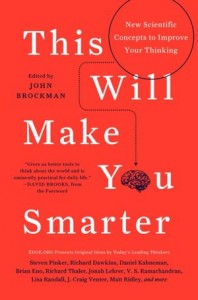 This Will Make You Smarter is a challenging book that leaves you with a lot to think about. The essays are short — some shorter than a single page — that cover interesting scientific concepts, new and old ideas to help us think about the world.
This Will Make You Smarter is a challenging book that leaves you with a lot to think about. The essays are short — some shorter than a single page — that cover interesting scientific concepts, new and old ideas to help us think about the world.
The founder and publisher of the online science salon, Edge.org, John Brockman, does a great job editing this collection, turning more than 100 essays on a wide range of topics into a coherent manuscript that works its way across the spectrum. You start out talking about one concept and smoothly work your way into another — it definitely kept me interested in topics that could potentially be pretty dry.
There are too many important concepts to cover them all, but there were a few that I found really interesting. First, there was an interesting article by Douglas Rushkoff* called “Technologies Have Biases.” This passage was thought-provoking:
“We are free to use any car we like to get to work — gasoline, diesel, electric or hydrogen-powered — and this sense of choice blinds us to the fundamental bias of the automobile toward distance, commuting, suburbs and energy consumption.”
And that’s true — we buy a hybrid because it’s “greener” and we are pro-environment, but the very fact of buying a car shows a preference that we don’t even think about.
I also found “The Focusing Illusion” by Daniel Kahneman** a fascinating idea:
“Marketers exploit the focusing illusion. When people are induced to believe that they ‘must have’ a good, they greatly exaggerate the difference that good will make to the quality of their life.”
Think about that and apply it to our current political climate. When politicians convince us that a particular issue is important, no matter what the issue, we attach an unreasonable importance to specific laws or measures related to that issue, and the difference they will make in the government. It has given me a different slant on the political commercials I have seen.
There are also a number of essays on risk and uncertainty, and just how bad humans are at understanding risk and dealing with it. The chance that we might be killed in a terrorist attack is almost infinitesimal, but we have spent a huge amount of money, time and effort protecting ourselves against the threat. On the other hand, we are far more likely to die in our car on the way to the grocery store, and yet many people don’t even bother with seat belts or regular brake checks.
All in all, this was a terrific, thought-provoking read that can be applied to so many aspects of modern life. I think that anyone who picks this up is going to find topics that interest them and cause them to rethink their usual assumptions. I would love to buy a copy for all of the teachers I know and challenge them to use some of these concepts in their classrooms! (There is a great essay on the importance of understanding which concepts are easy to teach and which ones are harder to grasp — they could start with that.) I will definitely be passing this on to some thoughtful friends.
My copy of This Will Make You Smarter: New Scientific Concepts to Improve Your Thinking was an Advanced Reader copy, provided free of charge.
* Douglas Rushkoff, Media theorist, documentary writer and author, Program or Be Programmed: Ten Commandments for the Digital Age
**Daniel Kahneman, Professor Emeritus of psychology and public affairs, Woodrow Wilson School, Princeton University; recipient, 2002 Nobel Memorial Prize in Economic Sciences

